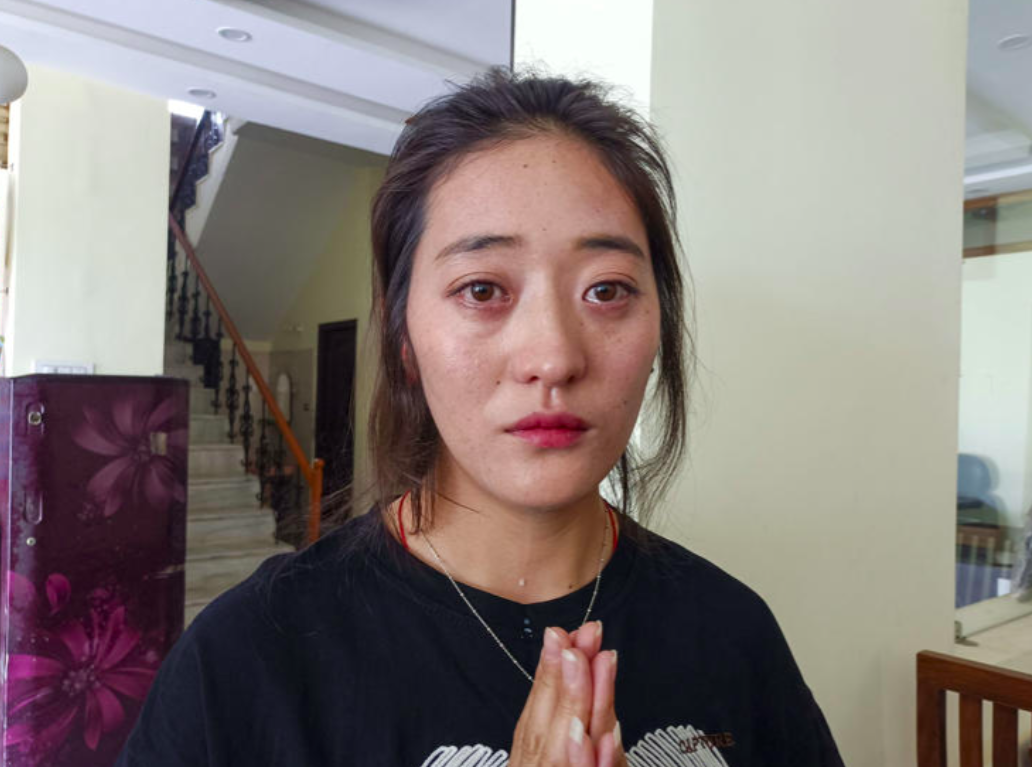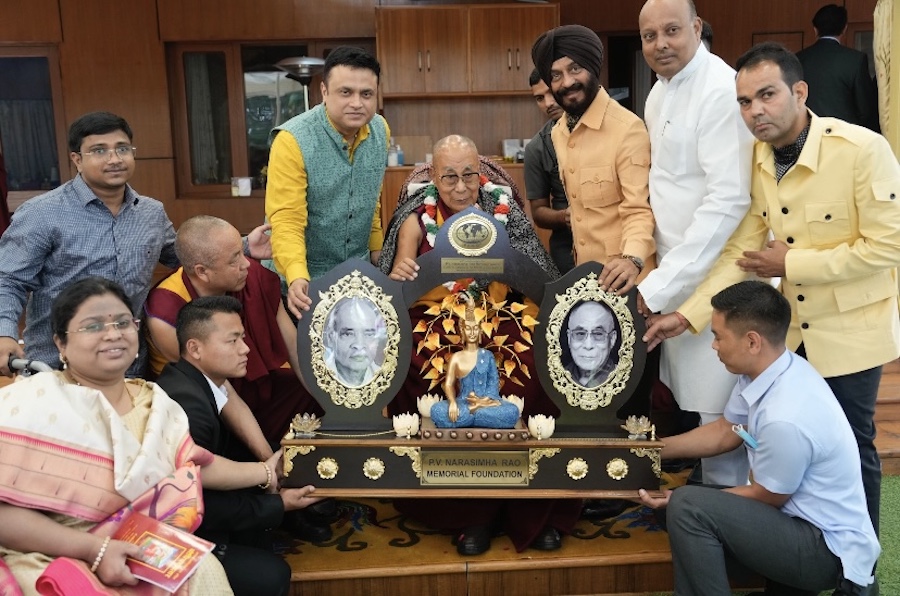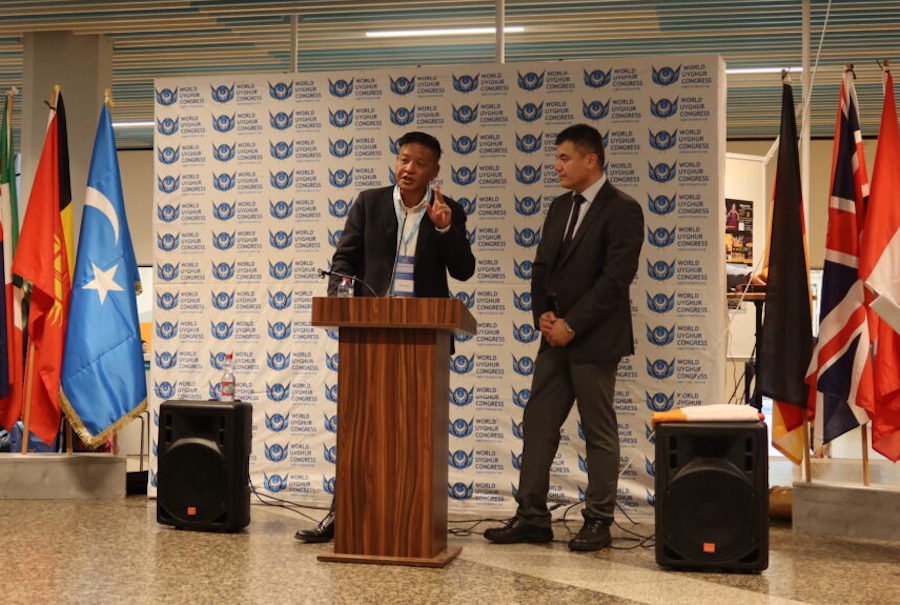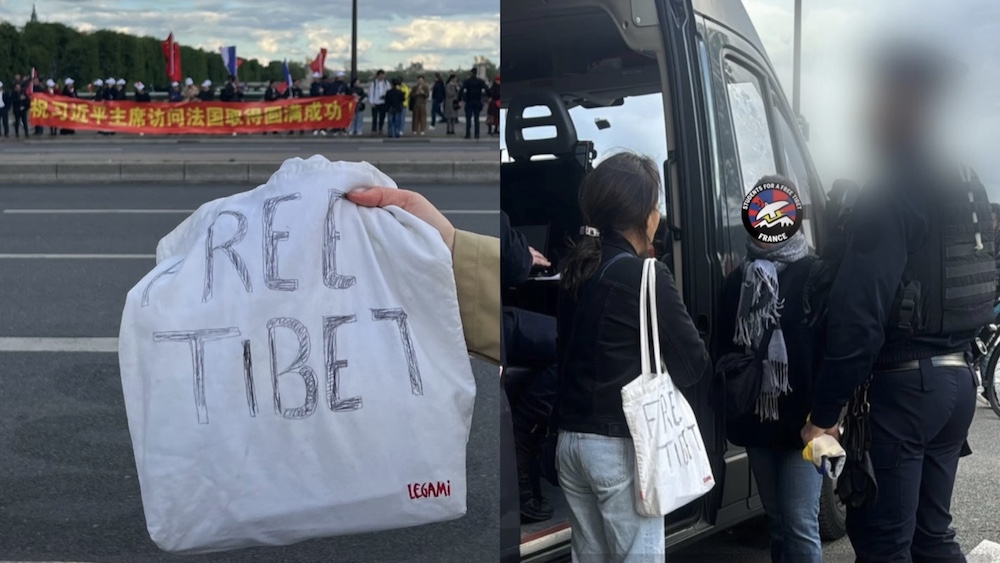By Phurbu Thinley
 Dharamsala, July 6: Braving heavy and incessant rain, thousands of Tibetan exiles, joined by visiting tourists and members from local Indian and Nepali community, Tuesday attended the 75th birthday celebration of His Holiness the Dalai Lama here.
Dharamsala, July 6: Braving heavy and incessant rain, thousands of Tibetan exiles, joined by visiting tourists and members from local Indian and Nepali community, Tuesday attended the 75th birthday celebration of His Holiness the Dalai Lama here.
Many Tibetans had been out since early in the morning, waiting for the celebrations to begin. Old men and women, Buddhist monks and nuns braved the rain to walk to the venue.
Special prayer sessions, including an incense-burning ceremonial ritual at Lhagyal Ri, were held for the continued well-being and long life of the Dalai Lama.
The official celebratory function, featuring a day-long cultural show was held at the courtyard of the Main Tibetan Temple (Tsuglag-Khang) in the presence of the Dalai Lama.
His Holiness the 17th Gyalwang Karmapa, leaders of the Tibetan government-in-Exile, including Kalon Tripa (Prime Minister) Prof. Samdhong Rinpoche, Speaker of the Tibetan Parliament Mr Penpa Tsering and other senior officials of the Central Tibetan Administration, and local Indian dignitaries attended the function.
A group of Chinese from Australia also greeted the Dalai Lama on the occasion. Well-wishers representing local schools and, Indian and Nepali community of Dharamsala presented birthday gifts and greetings to the Dalai Lama. Cultural songs and dances in traditional costumes were performed by Tibetan, Indian and Nepali artistes.
For Tibetans the world over, the Dalai Lama’s birthday is one of the most important and auspicious occasions in a year and is normally marked by elaborate celebrations in traditional Tibetan way.
The Dalai Lama remains the most powerful symbol of Tibetan people’s unity and their struggle for freedom. Tibetan people revere him as the undisputed head of state and the spiritual leader of Tibet.
In his brief speech to the gathering, the Dalai Lama thanked fellow Tibetans and well-wishers around the world for their birthday greetings and for holding honorary celebrations.
His Holiness, however, said the climate of fear prevailing inside Tibet would not allow Tibetans to commemorate the occasion in their own homeland.
“And those Tibetans back in Tibet, with all their regard and wishes in their heart, they have no choice to openly express them. I want to thank them for keeping their faith and determination,” the Dalai Lama said.
 “Other than that I have nothing special to say today. Since today is my birthday, it will not be appropriate if I have had to heave praise on myself, and of course I cannot vilify myself also on my special occasion,” the Dalai Lama said jokingly to a loud applause and thunderous laughter from the crowd.
“Other than that I have nothing special to say today. Since today is my birthday, it will not be appropriate if I have had to heave praise on myself, and of course I cannot vilify myself also on my special occasion,” the Dalai Lama said jokingly to a loud applause and thunderous laughter from the crowd.
His Holiness the 14th Dalai Lama of Tibet, Tenzin Gyatso, was born Lhamo Dhondub to a peasant family in a small village called Takser in Amdo (Ch: Qinghai) Province, north-eastern Tibet on 6 July 1935.
In 1950, the Dalai Lama was called upon to assume full political power after China’s invasion of Tibet in 1949. In 1954, he went to Beijing for peace talks with Mao Zedong and other Chinese leaders, including Deng Xiaoping and Zhou Enlai.
In 1959, after an aborted uprising in Lhasa against the Communist Chinese rule, thousands of Tibetans followed the Dalai Lama into exile and re-established Tibetan Government in Exile in the northern Indian town of Dharamsala where he now resides.
From Dharamsala he travels extensively around the world and occasionally meets with world leaders to present the case of Tibet and, also to promote human values and religious harmony, describing them as the main commitments of his life.
The Dalai Lama today advocates a “middle way approach” calling for a “real and meaningful” autonomy for Tibet within the framework of Chinese Constitution and an end to what he has said are widespread human rights violations against his people.
 Rounds of talks between his envoys and the Beijing government since the direct contact between the two sides was re-established in year 2002, after it turned into a complete deadlock way back in 1994, did not make any significant breakthrough.
Rounds of talks between his envoys and the Beijing government since the direct contact between the two sides was re-established in year 2002, after it turned into a complete deadlock way back in 1994, did not make any significant breakthrough.
Although the Tibetan leader has repeatedly and publicly stated he is not seeking separation and independence of Tibet, China has not stopped vilifying him as a “separatist” seeking Tibet’s independence.
The Dalai Lama was awarded the Nobel Peace Prize in 1989 for his relentless non-violent movement for the peaceful resolution of Tibet’s issue through dialogue with the Chinese leadership.
“For over fifty years, the Tibetans in and outside Tibet have been able to withstand the unbearable circumstances and emergencies with great courage and strength, and for over four generations the Tibetans have been able to maintain their religion, culture and tradition. This is solely due to the grace of His Holiness the Dalai Lama,” Tibetan Prime Minister Prof Rinpoche said in the Kashag’s statement today.
“The mutually beneficial Middle-Way policy, which has been adopted by the overwhelming majority of the Tibetans under the guidance of His Holiness the Dalai Lama, is the sole way to resolve the issue of Tibet. The Kashag is currently pursuing this policy, based on the fact that it enjoys the overwhelming majority support of the Tibetans and the Tibetan Parliament-in-Exile has endorsed it unanimously,” the statement added.
Young Tibetans have become increasingly restless and are skeptical that this kind of dialogue process with Chinese leadership will bring about any solid results.
Nevertheless, the Tibetan prime minister has this to say: “Furthermore, the fact that Tibetans have, in un-diminishing spirit, been able to continue our non-violent movement is a matter of great pride for us. Looking at the changes that are taking in the world and within the country, the issue of Tibet is heading towards finding a solution.”
Meanwhile, a global campaign network, Avaaz.org, has initiated a “Global Tribute” that will be delivered personally to the Dalai Lama on his 75th birthday at the Main Temple in Dharamsala. The signers and messages will be posted on a “wall of warm wishes” inside the main Temple in Dharamsala and will be broadcast across the region. Also, based on the outcome of the response, the organization will decide later tonight whether or not to roll this action into their entire membership of 5.5 million people network.









